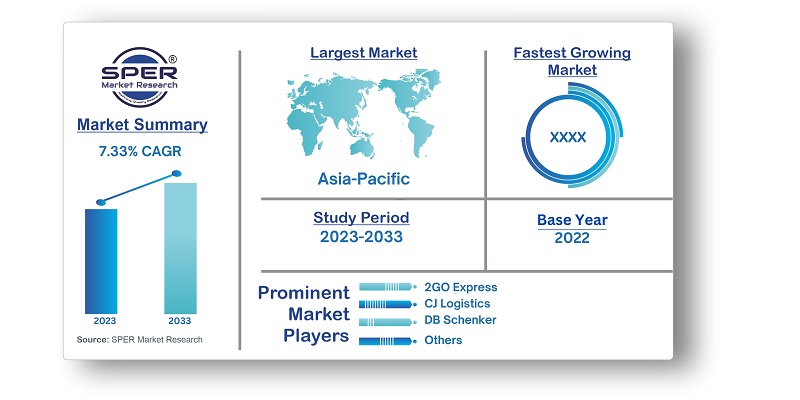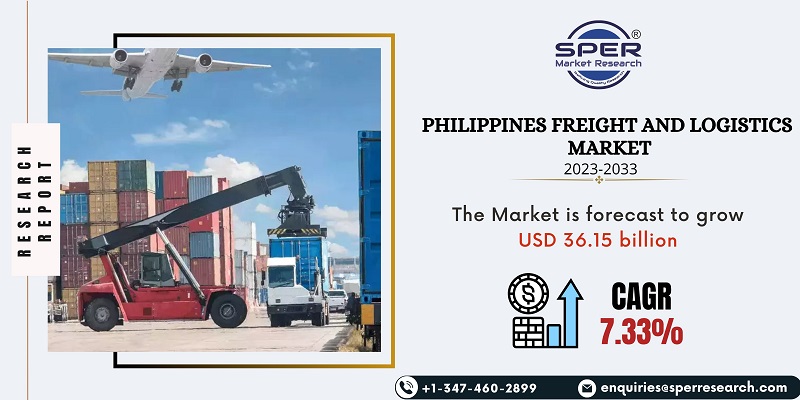
Philippines Freight and Logistics Market Growth, Trends, Size, Revenue, Challenges and Competition
Philippines Freight and Logistics Market Size- By Function, By End User- Regional Outlook, Competitive Strategies and Segment Forecast to 2033
| Published: Jul-2023 | Report ID: AMIN23122 | Pages: 1 - 102 | Formats*: |
| Category : Automotive & Transportation | |||
- November 2022: The Ayala Group aims to strengthen its presence in the less-regulated and profitable logistics industry by expanding its logistics business. Utilizing its logistics arm, AC Logistics Holdings Corp., the diversified conglomerate plans to acquire another company to broaden its operations. In August of the previous year, AC Logistics successfully finalized the acquisition of a 60 percent stake in Air 21 Holdings Inc. (AHI) for PHP 6.06 billion (USD 0.19 billion).
- June 2022: CEVA Logistics has set up a new facility spanning 14,000 square meters in Southeast Asia to enhance its capabilities in the region. The warehouse is specifically designed to cater to the electronics and food and beverage industries, offering a comprehensive range of services. The facility includes 13 loading bays, floor staging, storage for ambient and temperature-controlled dangerous goods, and an optimized shelf arrangement with a capacity of up to 16,000 pallet placements.

- Opportunities:
- E-commerce Logistics: The exponential expansion of e-commerce provides logistics companies with potential openings to provide specialized services like same-day delivery, reverse logistics, and fulfillment centers.
- Last-Mile Delivery Solutions: The demand for effective last-mile delivery solutions in urban and rural regions opens up avenues for companies to invest in pioneering delivery methods, such as drones and electric vehicles.
- Cold Chain Logistics: The rising need for temperature-controlled storage and transportation of perishable goods has created a growing opportunity for companies to invest in cold chain logistics infrastructure.
- Challenges:
- Inadequate Infrastructure: The Philippines encounters obstacles concerning insufficient infrastructure, such as congested ports, limited road and rail connectivity, and outdated logistics facilities, which impede the smooth movement of freight.
- Complex Customs Procedures: Complicated customs procedures, characterized by lengthy and intricate clearance processes, result in delays and higher transaction costs, negatively impacting the overall efficiency of the logistics supply chain.

| Report Metric | Details |
| Market size available for years | 2019-2033 |
| Base year considered | 2022 |
| Forecast period | 2023-2033 |
| Segments covered | By Function, By End User |
| Regions covered | CALABARZON, Cebu, Central Luzon, Metro, Manila, National Capital Region, Others |
| Companies Covered | 2GO Express, CJ Logistics, DB Schenker, Deutsche Post DHL Group, FedEx Corporation, JRS Express, Kuehne + Nagel International AG, LBC Express, Nippon Express, Nippon Yusen NYK , PHL Post, United Parcel Service, Others |
- E-commerce Businesses
- Freight Forwarders
- Government Agencies and Military
- Importers and Exporters
- Manufacturers and Suppliers
- Manufacturers of Heavy Equipment and Machinery
- Pharmaceutical and Healthcare Industry
- Retailers and Wholesalers
- Supply Chain Managers
- Third-Party Logistics (3PL) Providers
- Others
| By Function: |
|
| By End User: |
|
- Philippines Freight and Logistics Market Size (FY’2023-FY’2033)
- Overview of Philippines Freight and Logistics Market
- Segmentation of Philippines Freight and Logistics Market By Function (Freight Forwarding, Freight Transport, Value-added Services, Warehousing, Others)
- Segmentation of Philippines Freight and Logistics Market By End User (Agriculture, Fishing, and Forestry, Construction, Distributive Trade, Healthcare and Pharmaceuticals, Manufacturing and Automotive, Oil and Gas, Mining, and Quarrying, Other End Users)
- Statistical Snap of Philippines Freight and Logistics Market
- Expansion Analysis of Philippines Freight and Logistics Market
- Problems and Obstacles in Philippines Freight and Logistics Market
- Competitive Landscape in the Philippines Freight and Logistics Market
- Impact of COVID-19 and Demonetization on Philippines Freight and Logistics Market
- Details on Current Investment in Philippines Freight and Logistics Market
- Competitive Analysis of Philippines Freight and Logistics Market
- Prominent Players in the Philippines Freight and Logistics Market
- SWOT Analysis of Philippines Freight and Logistics Market
- Philippines Freight and Logistics Market Future Outlook and Projections (FY’2023-FY’2033)
- Recommendations from Analyst
1.1. Scope of the report1.2. Market segment analysis
2.1. Research data source
2.1.1. Secondary Data2.1.2. Primary Data2.1.3. SPER’s internal database2.1.4. Premium insight from KOL’s
2.2. Market size estimation
2.2.1. Top-down and Bottom-up approach
2.3. Data triangulation
4.1. Driver, Restraint, Opportunity and Challenges analysis
4.1.1. Drivers4.1.2. Restraints4.1.3. Opportunities4.1.4. Challenges
4.2. COVID-19 Impacts of the Philippines Freight and Logistics Market
5.1. SWOT Analysis
5.1.1. Strengths5.1.2. Weaknesses5.1.3. Opportunities5.1.4. Threats
5.2. PESTEL Analysis
5.2.1. Political Landscape5.2.2. Economic Landscape5.2.3. Social Landscape5.2.4. Technological Landscape5.2.5. Environmental Landscape5.2.6. Legal Landscape
5.3. PORTER’s Five Forces
5.3.1. Bargaining power of suppliers5.3.2. Bargaining power of buyers5.3.3. Threat of Substitute5.3.4. Threat of new entrant5.3.5. Competitive rivalry
5.4. Heat Map Analysis
6.1. Philippines Freight and Logistics Market Manufacturing Base Distribution, Sales Area, Product Type6.2. Mergers & Acquisitions, Partnerships, Product Launch, and Collaboration in Philippines Freight and Logistics Market
7.1. Philippines Freight and Logistics Market Value Share and Forecast, By Function, 2023-20337.2. Freight Forwarding7.3. Freight Transport
7.3.1. Air7.3.2. Rail7.3.3. Road7.3.4. Sea & Inland Water
7.4. Value-added Services7.5. Warehousing7.6. Others
8.1. Philippines Freight and Logistics Market Value Share and Forecast, By End User, 2023-20338.2. Agriculture, Fishing, and Forestry8.3. Construction8.4. Distributive Trade8.5. Healthcare and Pharmaceuticals8.6. Manufacturing and Automotive8.7. Oil and Gas, Mining, and Quarrying8.8. Other End Users
9.1. Philippines Freight and Logistics Market Size and Market Share
10.1. Philippines Freight and Logistics Market Size and Market Share By Function (2019-2026)10.2. Philippines Freight and Logistics Market Size and Market Share By Function (2027-2033)
11.1. Philippines Freight and Logistics Market Size and Market Share By End User (2019-2026)11.2. Philippines Freight and Logistics Market Size and Market Share By End User (2027-2033)
12.1. Philippines Freight and Logistics Market Size and Market Share By Region (2019-2026)12.2. Philippines Freight and Logistics Market Size and Market Share By Region (2027-2033)12.3. CALABARZON12.4. Cebu12.5. Central Luzon12.6. Metro Manila12.7. National Capital Region12.8. Others
13.1. 2GO Express
13.1.1. Company details13.1.2. Financial outlook13.1.3. Product summary13.1.4. Recent developments
13.2. CJ Logistics
13.2.1. Company details13.2.2. Financial outlook13.2.3. Product summary13.2.4. Recent developments
13.3. DB Schenker
13.3.1. United Parcel Service13.3.2. Financial outlook13.3.3. Product summary13.3.4. Recent developments
13.4. Deutsche Post DHL Group
13.4.1. Company details13.4.2. Financial outlook13.4.3. Product summary13.4.4. Recent developments
13.5. FedEx Corporation
13.5.1. Company details13.5.2. Financial outlook13.5.3. Product summary13.5.4. Recent developments
13.6. JRS Express
13.6.1. Company details13.6.2. Financial outlook13.6.3. Product summary13.6.4. Recent developments
13.7. Kuehne + Nagel International AG
13.7.1. Company details13.7.2. Financial outlook13.7.3. Product summary13.7.4. Recent developments
13.8. LBC Express
13.8.1. Company details13.8.2. Financial outlook13.8.3. Product summary13.8.4. Recent developments
13.9. Nippon Express
13.9.1. Company details13.9.2. Financial outlook13.9.3. Product summary13.9.4. Recent developments
13.10. PHL Post
13.10.1. Company details13.10.2. Financial outlook13.10.3. Product summary13.10.4. Recent developments
13.11. United Parcel Service
13.11.1. Company details13.11.2. Financial outlook13.11.3. Product summary13.11.4. Recent developments
13.12. Others
SPER Market Research’s methodology uses great emphasis on primary research to ensure that the market intelligence insights are up to date, reliable and accurate. Primary interviews are done with players involved in each phase of a supply chain to analyze the market forecasting. The secondary research method is used to help you fully understand how the future markets and the spending patterns look likes.
The report is based on in-depth qualitative and quantitative analysis of the Product Market. The quantitative analysis involves the application of various projection and sampling techniques. The qualitative analysis involves primary interviews, surveys, and vendor briefings. The data gathered as a result of these processes are validated through experts opinion. Our research methodology entails an ideal mixture of primary and secondary initiatives.



Frequently Asked Questions About This Report
PLACE AN ORDER
Year End Discount
Sample Report
Pre-Purchase Inquiry
NEED CUSTOMIZATION?
Request CustomizationCALL OR EMAIL US
100% Secure Payment






Related Reports
Our Global Clients
Our data-driven insights have influenced the strategy of 200+ reputed companies across the globe.




















